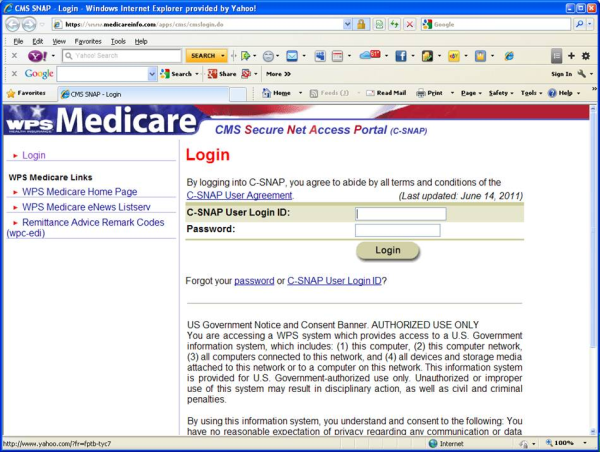Following on the heels of our recent article, “Billing and Coding for the Medicare Annual Wellness Visits,” we got this comment from a reader:
Medical Billing Blog
Ali Ziehm
Recent Posts
Check Patient Eligibility For Wellness Visits To Ensure Reimbursement
Billing and Coding For the Medicare Annual Wellness Visits
By Christine Moore, CPC -- There seems to be some confusion out there from both physician offices and patients as to what is included in the Medicare Wellness Visits. Office staff should be familiar with codes G0402, G0438, and G0439 to be able to explain to patients the purpose and scope of these visits. Medicare coverage includes three different types of Wellness Visits that are offered to all enrollees, but these visits do not include a routine physical checkup. They are intended to be a meeting between physician and patient to discuss current health status, and to devise a plan for maintaining good health, setting a schedule for preventive health screenings, and treating or stabilizing chronic ailments. Medicare beneficiaries are eligible to receive the services associated with the Wellness Visits at no charge to the patient, with no copay or deductible due for the Annual Wellness Visit (AWV) itself, but if other services are provided during the course of the AWV, the patient is responsible for any copay or deductible applicable to those extra services. Together, the three types of wellness visits are designed to establish and maintain regular contact between patient and physician, to ease communication about health and wellness issues, and to provide a basis for regular updating of patient records with regard to overall health. Each type of visit is indicated at a specific point during the term of the patient’s coverage under Medicare, and there are specific guidelines for time periods during which each visit is payable.
Where Should I Send My Bill? Treating Young Adults (Part 3 of 3)
Ralph Sitler III, J.D. -- In the first two installments of this blog series, we covered some fundamental principles that deal with providing care to minors, obtaining appropriate authorization to provide the care, and how to determine who is responsible to pay for the services rendered. As discussed, it’s not always the parent or guardian of the minor obtaining services.
Who Pays For Services Provided To Minors? (Part 2 of 3)
By Ralph Sitler III, JD -- Last week, we discussed why it’s important for providers to consider the type of service rendered to minors when determining who has authority to contract that service, and how to determine who bears financial responsibility to pay for those services under various conditions. Essentially, we covered what types of services minors can authorize on their own behalf, and whom to bill for the services. We also discussed some pretty serious considerations to take into account when submitting claims to an insurance plan for reimbursement of services self-authorized by minors when the insurance plan policy holder is the minor’s parent or guardian. HIPAA guidelines are a little vague when it comes to notification of other individuals when a minor has self-authorized, so be sure to check out that first blog in this series to make sure you’re up to date on the guidelines.
What You Need To Know About Payment For Service To Minors
By Ralph Sitler III, JD -- It’s important for health care providers to determine how the services rendered will be paid, and who is responsible for payment. Since financial responsibility often falls on a guarantor other than the patient, it can be a can of worms to try to figure out where to send the bill for certain patients under certain circumstances. For example, it can be difficult to assess financial responsibility when treating minors. This is because minors can fall into any of several demographic categories when treatment is sought, and can even authorize their own care in some instances. Because of this situational power to authorize their own care, the parents or guardians of a minor may at times disclaim financial responsibility for services rendered to the child. So if a bill goes unpaid, can you pursue the parent or guardian for payment? Maybe, maybe not.
Maximize Reimbursement from Incident-To Billing
By Ralph Sitler III, JD -- Non-physician providers play an important role in medical practices these days, including nurse practitioners and a host of others. Understanding how Medicare recognizes these midlevel providers for reimbursement purposes is important for any practice utilizing their services. Compliance with Medicare guidelines for this type of billing is important if you want to be reimbursed correctly and stay on the right side of regulatory bodies.
Using Established Patient E/M Codes To Maximize Reimbursement
By Christina Hussan -- When a provider has not seen a patient for three or more years, it is permitted to bill for a new patient office visit. Actually, the time period is “three years plus one day,” to be exact, but the rules change when the patient has seen other providers in the group during the interim. It goes like this: If a patient has not seen any provider in a practice in three years (plus one day!), then it is appropriate to bill for a new patient office visit, but if any provider in the practice has seen the patient at any time within that three year period, it is required that the billing go through for an established patient visit.
Proper Use of Modifier 59 Can Increase Revenue for Medical Practices
By Heather Lakner, CPC -- Modifier 59 can be used in appropriate circumstances to unbundle codes to make them separately payable under Medicare guidelines. This can mean an increase in revenue for medical practices in circumstances when this modifier is appended correctly, with proper documentation to support its use. Unfortunately, Modifier 59 is often used incorrectly. Many billers will append it to a service to override an edit, but this can set up their medical practice for a substantial audit risk if it is applied incorrectly, or if cirumstances in the patient’s medical record do not clearly indicate that its use is appropriate.
Medical Billing Resources yesterday launched a new website with features designed to be of greater help to its clients and the healthcare community at large.
Newly released guidelines from the Federation of State Medical Boards of the United States warn physicians and other healthcare providers to err on the side of caution and professionalism in all cases when using social media, especially when dealing with current or past patients or the public at large.





















